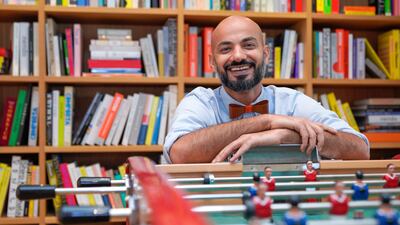The idea to create an Arabic language edutainment app struck Badr Ward in 2012, when he noticed his young children – daughter Joory and son Adam – were spending a considerable amount of time on their devices, which prompted the Palestinian-Canadian to research the number of Arabic-speaking children globally.
When Mr Ward realised the scale of the captive market, he established Lamsa, which means “touch” in Arabic, an advertisement-free app that focuses on early childhood development for children aged between 2 and 8 using interactive Arabic stories, songs, games and videos. The app aims to make screen time for children more meaningful and motivate them to read and learn in Arabic.
“All other innovations target youth and adults," says Mr Ward, 36. "I realised Lamsa has a huge untapped population to cater to. We will focus on early childhood development for Arabic-speaking children in the Middle East and then expand to other emerging markets and potentially be a global solution provider."
Launched in 2014, the Lamsa app follows a subscription-based business model and is available on both Android and iOS platforms. The fee varies per country, ranging from $1 (Dh3.67) in some markets to $8 in others.
“We opted to go for the subscription model because as a parent, you don’t want to be overburdened by continuous in-app purchases. With a minimal subscription fee, your children can get access to a full programme of early childhood development that is being continuously updated,” Mr Ward explains.
The edutainment app has been downloaded more than 17 million times so far. In the UAE, it's been downloaded more than 300,000 times. Its biggest markets are Saudi Arabia, which accounts for 40 per cent of all downloads, followed by Egypt, then the rest of North Africa (each accounting for 20 per cent of overall downloads).
Lamsa has so far raised more than $15 million (Dh55.1m) through equity, debt and grants and is currently completing a Series A funding round. “We are in the closing stage of a multimillion-dollar capital raise. We have a great partner in Abu Dhabi Investment Office. It is part of the round,” says Mr Ward.
The EdTech company is based at Hub71, the start-up incubator located within the Abu Dhabi Global Market, the financial free zone on Maryah Island. It was one of the first start-ups to join Hub71.
The firm’s senior managers, the R&D team, product and technology staff are all based at the Abu Dhabi office. Lamsa also has offices in Jordan, Saudi Arabia, Germany and Finland.
“Hub71 has the vision of becoming the first global inter-connected hub that connects innovation from this part of the world to the global landscape," says Mr Ward. "By having the right kind of backing from its partners such as Mubadala [Investment Company], Ghadan 21 stimulus programme and SoftBank Vision Fund, start-ups like Lamsa get good exposure. Start-ups can tap into a global platform via an advanced, state-of-the-art platform in Abu Dhabi and focus on innovation.”
Lamsa had already secured some funding from the Mohammed bin Rashid Innovation Fund (MBRIF), an initiative of the UAE Ministry of Finance, in 2018. MBRIF aims to provide monetary support to local innovators in areas such as renewable energy, transportation, education, health, water, technology and space.
“You get access to affordable funding through a strong government-backed guarantee without having to give up equity. This is unique. I have looked at cases around the world and haven’t seen anything as progressive as this,” says Mr Ward.
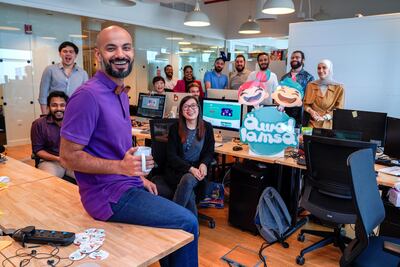
“As long as start-ups have a proven model, the right user economics, right market segmentation and innovation at their core, the fund will support you. MBRIF supports SMEs in contributing to the UAE’s continuous development and diversification ambitions.”
Lamsa's 60 employees hail from a range of backgrounds, including the likes of Disney and Japan’s animation industry, aiming to provide educational experiences that are fun and interactive.
Mr Ward and his team also work with education specialists from New York University Abu Dhabi and Abu Dhabi Early Childhood Authority (ECA), as well as experts from Finland and Germany.
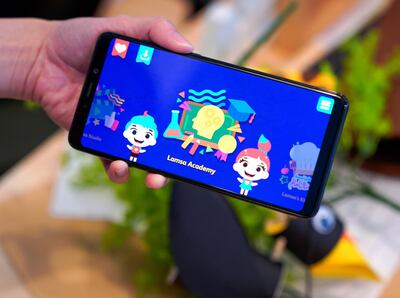
“It involved a lot of trial and error. We needed people from varied backgrounds – animation, gaming, artists, musicians, illustrators, designers, graphics, researchers, educators – to come up with the magic formula. Everyone can have great ideas, but the ability to turn it into a magical experience requires a lot of talents to work together under one roof. Now, we have our proprietary model.”
In July this year, the ECA also awarded equity-free funding to Lamsa through a new entrepreneurship programme called Anjal Z, which aims to identify promising start-ups aimed at early learning.
“We were among the first participants in Anjal Z, which focuses on bringing innovation to early childhood development. By working closely with the ECA, we are deep-diving into educational products for schools and nurseries,” says Mr Ward.
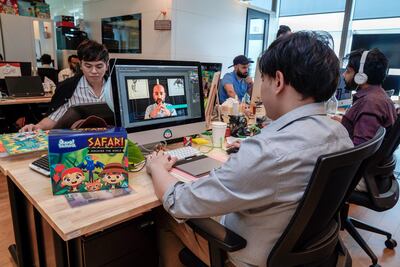
Lamsa is also in the process of building a school-specific offering that will be unveiled in 2021, he says. The programme will be launched in the UAE and then rolled out to other markets.
Mr Ward says the team accelerated innovation and reacted proactively to school closures across the Arab world following the Covid-19 outbreak, with the EdTech firm launching four new initiatives to cater to distance learning requirements for children. These include Lamsa Hope, offered free of charge in the UAE and Mena region; Lamsa Care, in which the app is given free of charge to children in need; Lamsa Studio, an initiative to help children and parents channel their creativity by creating content for other kids; and Lamsa Summer Camp, a digital summer camp for children in the Mena region.
“The conceptualisation, research, implementation and roll-out of all these initiatives were done during the pandemic. All of this resulted in a more than 100 per cent increase across all our engagement metrics and KPIs throughout Covid-19 in comparison with the months before the pandemic,” Mr Ward says.
The company segments its growth plans into three categories: vertical, horizontal and greenfield.
“Vertical expansion is penetrating further in our existing markets, horizontal expansion is looking at new, emerging markets, while greenfield expansion is when we launch new products such as Lamsa Summer Camp, Lamsa Studio, etc. We are also launching a back-to-school product soon,” the founder says.
Mr Ward says every day is a challenge for start-ups, but the nature of these changes as a business matures.
For instance, the first challenge is making sure the business model is right, then it's finding your first employees and then growing the team.
“The biggest challenge that Lamsa faces now is to keep up with the scale and demand. After the pandemic, every business needs to find the balance between growth and sustainability. We need to learn from the mistakes we have seen globally,” he says.
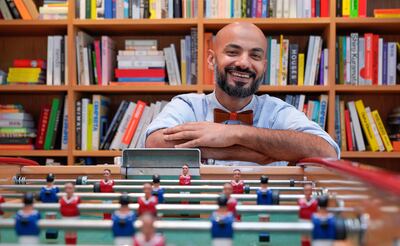
Q&A with Badr Ward, founder of Lamsa
What successful start-up do you wish you had started?
I like where Amazon started and where they have reached. Amazon started with books and now offers everything to do with lifestyle. There is something in the Amazon case that catches our attention and gives us good references at different points. It is inspirational.
What new skills have you learned from launching your venture?
Too many! One of the most beautiful things about launching a start-up is that you learn every day. You learn about customers, marketing, product development ... you become a better person. Being a founder is a continuous journey of learning.
If you could do it all again, what would you do differently?
I would never lose sight of my customers and their needs. During the early days of any business, including Lamsa, we tend to spend too much time in conference rooms with the team and the board. I wish I had instead spent more time sitting with kids and testing products.
What did you do before launching Lamsa?
I was a technology consultant. Later, I established multiple start-ups in the form of experimentation. For instance, I developed an e-book reader for Arabic books, similar to Kindle.
